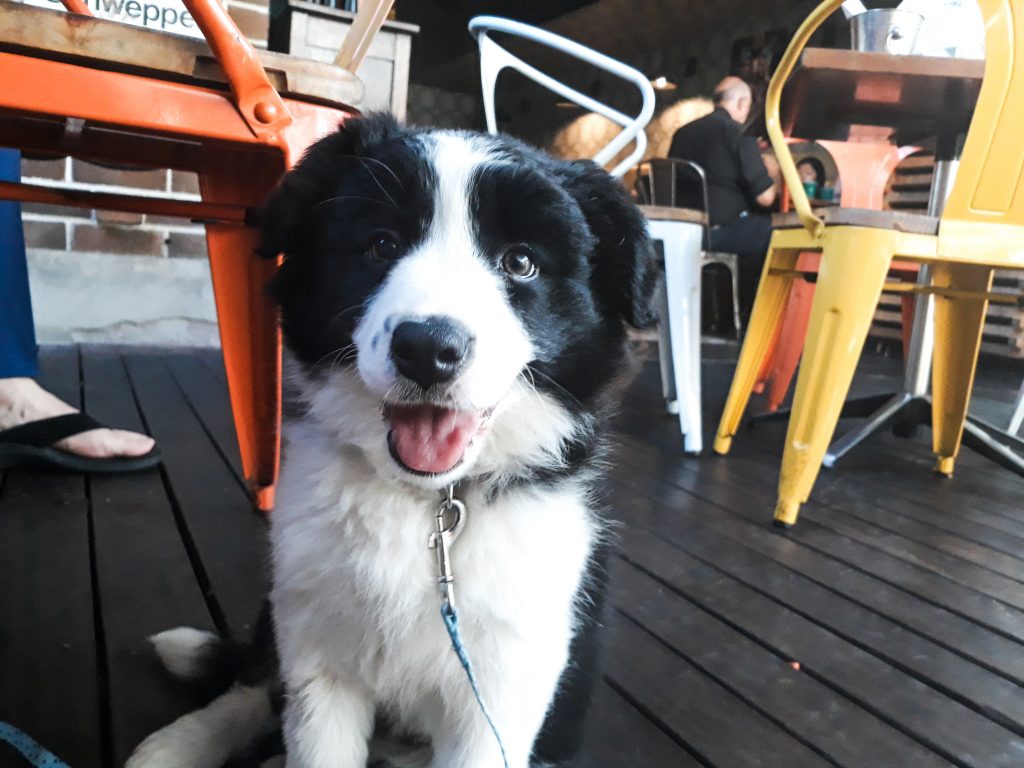Puppy School: Teaching You to Raise a Puppy
Puppy School is a great way to start your puppy’s important socialisation training!
Puppies are dogs, not human babies. And they are born knowing how to be dogs, so it’s normal for them to bark, whine, cry, jump, nip and even bite when they communicate with us and other dogs. Having a puppy is lovely – they are very cute- but it isn’t easy to raise them. However with the right amount of care, knowledge, training and attention, you can teach your puppy how to behave and grow up to become a balanced adult dog! Puppy School is great for this!
Social skills
Socialisation training is one of the most important aspects of dog training. And it’s especially important with young puppies. But it doesn’t mean dog play, like most people seem to think. It means getting your puppy used to and exposed to different situations, environments, people, dogs, other animals, sounds etc. in a positive way so that none of these things won’t become scary for your dog later on. A good puppy school makes sure that these things are practised and you’ll know how to continue your training at home.
It’s important to socialise puppies to as many new positive experiences with people, sounds, environments and other dogs as possible before 16 weeks of age. By then they are still young enough to take everything in.
A puppy’s first big learning period begins at about three weeks old, when their eyes and ears open to the big wide world. The next important socialisation period is between 7-12 weeks which, unfortunately, is exactly the time your vet will tell you to keep your puppy isolated while vaccinations take effect. By doing so, you will risk getting serious behaviour issues due the lack of socialisation.
There are ways to ensure your puppy grows into a well-adjusted, sociable dog without isolating your puppy at this important time.
• If you can’t take your puppy into the world, bring the world to your puppy! Invite people over to help your puppy get used to people of different ages, sexes, builds and races. Make sure to meet kids, older people, females and males of all shapes and sizes. Encourage them to wear different types of clothing, some dogs for example react to all black clothing. And arm everyone with treats!
• Meet your friends’ friendly and healthy dogs that are up to date with their vaccinations.
• Puppy school is also a great way to socialise and introduce your new pet to other pups.
• Drive around with your pup! Not only does this get your pup used to car travel, but also gives them the chance to see and hear the world.
• Sound training is also a helpful training aid.
• Start practising handling your puppy for vet checks, baths and blow dry. Check their teeth, ears, hold their paws and touch them all over on daily basis. Start clipping their nails carefully, and giving them gentle baths. Use treats!
• Remember, don’t do anything as a one off! Repeated exposure is essential for training and getting a dog used to different things.
Join my next Puppy School in Stanmore!
Location: Life on the Hedge, pet shop, 102 Percival Rd, Stanmore NSW 2048
Date: 3rd of February 2019 at 10.00am
Book your puppy in for my puppy school online!
My Stanmore Puppy School is a fun and educational 4 week puppy class. Your puppy is allowed to socialise and learn new skills in a positive way with other puppies in a safe environment.
Suitable for puppies age 8-20 weeks
In this Puppy Class your puppy will learn:
- Basic commands and manners
- Socialisation with other puppies and different objects like skateboard, vacuum cleaner etc.
- Sound training
- Leash manners and greeting/meeting skills
- Fun tricks and games.
You will learn:
- How to better train and control your puppy through understanding how they experience the world around them.
- How to read your puppy’s body language and prevent issues.
- Calming handling techniques.
- A puppy’s view of the big wide world.
- Advice on common ‘unwanted’ puppy behaviours such as Toilet training, Biting, Jumping, Hyper-activity, Separation behaviours.
A puppy needs a good learning foundation
A puppy needs a good learning foundation to become a confident adult. That’s why training a puppy is more than just teaching basic commands such as sit and stay. The most important aspect of the learning process is to introduce puppies to the environments and situations they are likely to experience during their lives. Socialisation with different objects, people, dogs, other animals, surroundings, noises etc. is very important for the future of a puppy.
Your Puppy’s brain is like a sponge and every experience is stored away in their memory affecting their personality. While a puppy might be born with a certain temperament, it is the way they are raised and the experiences the have that will truly determine their personality. The more positive and enriching experiences, the more confident your dog will be as an adult.
Puppies learn all the time, not just when they are being trained
Your behaviour and the way the puppy is handled will influence the development. Since punitive handling and harsh corrections will damage your pup as they mature, stay away from punitive trainers and any equipment that can be harmful, including shock, choke or prong collars.
Puppies need gentle guidance into making good decisions. They need to be allowed to investigate their environments and given positive reinforcement for the good behaviour. They also need to be redirected from unwanted behaviour. All puppies need boundaries, but these must be given in a humane way. A puppy that experiences fear or rough handling as growing up is more likely to become reactive and show aggressive behaviour later in life.
The time and effort spent giving your puppy a good learning foundation will pay off throughout their life. Puppies are certainly cute, but raising one can be very challenging. Seeing a pup develop into a confident adult, however, is worth all the hard work.
When it comes to training, the early weeks and months of your puppy’s life are essential.
The most critical time for your puppy’s learning is between 8-12 weeks.
This is the time period they are most open to new things and need to experience many different positive encounters to become a confident adult. Dogs learn vital socialisation and communication skills when they are young. Therefore early life experiences influence how your puppy will play, communicate and learn as they develop into an adult dog.




Hi Aniina, we have a nine month golden retriever cross who want to bring to your Obedience training. We also…
Good afternoon, How old does your dog have to be to commence at the beginners agility dog class. 12month?? Thank…
Hi, I have a 3 year old cocker spaniel who is quite reactive. She reacts to bikes, bicycles, children, and…
Hi Can I bring my Daughter along to the Puppy class? thanks
Hi Anniina. What if one of the Saturdays is raining? Is the class pushed out to the next week or…